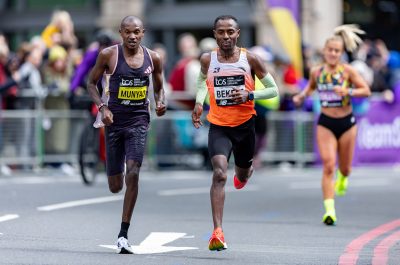Kenenisa Bekele’s Olympic Dream Revived as He’s Named to 2024 Ethiopian Marathon Team
Twelve years after his last Olympic appearance, the three-time gold medalist Bekele is heading back to the sport's greatest stage
By Jonathan GaultOne of the sport’s all-time legends will get one last crack at the Olympic Games. Kenenisa Bekele, who will turn 42 years old next month, is set to compete at his first Olympics since 2012 after the Ethiopian Athletics Federation announced its 2024 Olympic marathon teams on Thursday.
Bekele, who finished 2nd at April’s London Marathon, is joined on the men’s team by Boston Marathon champion Sisay Lemma and Seville Marathon champion Deresa Geleta. The women’s team consists of world record holder Tigst Assefa (who is competing at the Olympics for the first time since 2016, when she ran the 800 meters), world champion Amane Beriso, and London Marathon 4th placer Megertu Alemu. Tamirat Tola, who ran 2:04:58 in November to break a 13-year-old course record at the New York City Marathon, was the biggest name left off the team after dropping out of London this spring.
Tola and Boston runner-up Mohamed Esa were named as men’s reserves while 2022 world champ Gotytom Gebreslase and Boston 4th placer Buze Diriba are the women’s reserves.
It has been a long, long road back to the sport’s grandest stage for the great Bekele. After dominating the world of distance running in the 2000s, a decade in which he won three Olympic golds and five World Championship golds across the 5,000 and 10,000 meters, Bekele finished 4th in the 10,000 at the 2012 Olympics before moving up to the marathon in 2014.
Bekele’s Swan Song
In the ensuing 10 years, Bekele has occasionally shown why many consider him to be the greatest distance runner of all time, winning the Berlin Marathon in 2016 and 2019 and scaring the world record each time (his 2:01:41 pb makes him the third-fastest marathoner in history). But as Bekele’s fame and business interests expanded, he also struggled to replicate the disciplined, repetitive lifestyle that powered him to five straight short course/long course sweeps at the World Cross Country Championships from 2002-06 and world records at 5,000 and 10,000 meters. Coupled with a series of injuries, Bekele was rarely able to put together two good races back to back. Ethiopia left him off its 2016 Olympic marathon team and he was not picked in 2021 after failing to run Ethiopia’s hastily-organized trials.
For long stretches, it appeared that the 2012 Olympic 10,000 in London, where Mo Farah knocked him off his perch and where Bekele was beaten out for bronze by his younger brother Tariku, would be the final image of Bekele at an Olympic Games. Even as recently as March, when he finished 7th in the NYC Half Marathon in 63:59, beaten by the likes of Reed Fischer and Tristan Woodfine, Bekele seemed a longshot to make the Ethiopian Olympic team.
But when Bekele needed to be great, he was. Bekele needed to show something at December’s Valencia Marathon to even be considered for selection, and he responded with a master’s world record of 2:04:19, his fastest time in more than four years. His Olympic chances now had a pulse, but he still entered this year’s London Marathon on April 21 knowing anything less than a brilliant run would kill his Olympic dream. Somehow, the 41-year-old Bekele turned back the clock, sharing the lead as late as 24 miles and holding on to finish 2nd in 2:04:15. That, coupled with a DNF from Tola, was enough for Bekele to earn the nod from the Ethiopian selectors.
Now Bekele is off to Paris for one final Olympic battle with Kenya’s 39-year-old Eliud Kipchoge, who is chasing an unprecedented Olympic marathon three-peat. It is a fitting venue. Twenty-one years ago, Bekele and Kipchoge won their first global track titles (the latter in a race for the ages over Bekele and Hicham El Guerrouj) at the Stade de France in Saint-Denis, the same stadium that will host the Olympic track events this summer. The two have continued to wage war ever since, Bekele largely dominating on the track (he won 5,000 silver to Kipchoge’s bronze at the 2004 Olympics and 5,000 gold to Kipchoge’s silver in 2008) and Kipchoge owning the marathon. Paris will be the 25th head-to-head meeting in their careers (Bekele holds a 15-9 edge) and the first since the 2018 London Marathon, won by Kipchoge.
This is distance running’s Brady vs. Manning, our Ronaldo vs. Messi, two men who transformed the sport and defined an era. But that era is not quite over. There is one more chapter to be written, and it will come on the streets of Paris on August 10.
Two thoughts on the Ethiopian team
1) It’s astounding that Bekele actually made this team
I don’t mean that Bekele was some crazy selection by the Ethiopian federation — Bekele certainly had a case to be on the team, as LetsRun.com’s Robert Johnson outlined after London. Rather, it is incredible that Bekele is back at the Olympics after the highs and lows (mostly lows) since his last appearance 12 years ago.
Bekele was written off in 2019 before he returned with his 2:01:41 in Berlin. By the time of the 2021 Olympics, it appeared certain that Bekele — who was two years removed from his last marathon and would be 42 by the next Olympics — would never compete at another Games. But no matter how Bekele’s results have gone, he has never stopped believing he has more greatness ahead of him in the marathon. In Paris, he will get the opportunity to show it.
It is also incredible that we will get Bekele against Kipchoge again this summer. Both men medalled at the 2004 Olympics, and it is not out of the question that both could medal again in 2024. That is some remarkable longevity.
For the record, if Bekele were to win the Olympic marathon, the 20-year gap between his first and last Olympic golds would easily be the largest ever for a track athlete, as noted below by ace Olympic statistician Bill Mallon. It would also be the longest gap in any men’s event since German sailor Jochen Schümann won gold in 1976 and 1996.
However, @jgault13, since I assume you're only interested in athletics, here are the biggest gaps between 1st and last gold in athletics:
YBtG Name Gender NOC Sport YrsGold
13 Allyson Felix F USA ATH 2008/2012/2016/2020
13 Shelly-Ann Fraser-Pryce F JAM ATH 2008/2012/2020
12 Carl…— Bill Mallon (@bambam1729) May 16, 2024
2) Tamirat Tola had a case to be on the team, but this was not an Athletics Kenya-level screwjob
After the 2024 spring marathon season, there were two clear locks for the Ethiopian Olympic marathon teams: Valencia/Boston champ Sisay Lemma on the men’s side and world record holder Tigst Assefa on the women’s side. Both were selected.
The other four spots were up for grabs and went to Bekele and Deresa Geleta on the men’s side and Amane Beriso and Megertu Alemu on the women’s side. There were cases to be made for and against each athlete, but this is not a Brigid Kosgei situation, whose presence on the Kenyan team remains impossible to justify.
On the men’s side, we expected it would come down to Bekele, Tola, and Deresa Geleta, the fastest Ethiopian of 2024 after running 2:03:27 to win Seville (Rojo laid out the case for and against each man in detail here). Tola had a lot of things working in his favor — a 2016 Olympic bronze in the 10,000, a 2022 world title in the marathon and, most notably, a 2:04:58 course record in New York six months ago. But Tola also DNF’d two of his last three marathons — the 2023 Worlds in Budapest and 2024 London (against Bekele). The Ethiopian selectors have traditionally put a lot of stock in times when picking teams on the track, and if that is the case, Tola’s 2:04:58 in New York may not have helped him that much, even though it is worth much faster on a flat course.
If I were personally picking the team, I’d have taken Tola over a 42-year-old Bekele and Geleta, who has never run a World Marathon Major in his life, let alone the Olympics. But if selectors are looking at recent form, the two DNFs are a legitimate concern, particularly compared to Bekele (2:04 in his last two marathons) and Geleta (wins in Beijing and Seville).
On the women’s side, this was always going to be a difficult decision. Last month, I wrote there were five contenders for the final two spots behind Assefa: Amane Beriso, Megertu Alemu, Tigist Ketema, Sutume Kebede, and Worknesh Degefa. As with the men’s selections, the Ethiopian federation placed a value on consistency. Degefa, who withdrew from Boston in April, and Ketema, who was only 7th in London, both missed out. Instead, they chose Beriso (1st 2022 Valencia, 2nd 2023 Boston, 1st 2023 Worlds, 3rd 2024 Tokyo) and Alemu (3rd 2022 London, 2nd 2023 London, 3rd 2023 Chicago, 4th 2024 London).
Kebede might be feeling a little hard done by considering she beat Beriso head to head to win Tokyo in March (2:15:55 to 2:16:58). But Kebede’s results in 2023 were poor (DNF London, 15th Chicago) while Beriso was the world champ. There’s an argument for Kebede as an upside pick over Alemu, but both Beriso and Alemu have multiple strong marathons within the qualification window while Kebede only has one.

